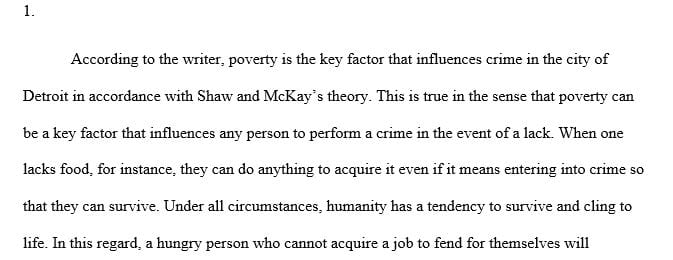Think of a friend who has mean parents who label the friend with negative labels
WEEK 9: Detroit & Social Disorganization Theory Nicole F
Question At the macro level Shaw and McKay’s theory argues that five structural characteristics of neighborhoods or even whole cities shape the rate of crime. Apply this perspective to the city of Detroit, which has one of the highest violent crime rates in America. Might these five variables as discussed in class/reading have anything to do with the high crime rate in the city of Detroit? Explain. Which of the variables probably does not explain the high crime rate in Detroit?
The students’ Answer Shaw and McKay’s five characteristics are poverty, family disruption, residential instability, ethnic heterogeneity, and population density. Most if not all of these have an impact on the high crime rate in Detroit. I think the biggest and easiest to point out is the high amount of people living in poverty. The criminals can use this as a means of justification in committing crime. They can’t find work so their job becomes illegal activity such as stealing from people on the street or going to neighboring towns where the citizens may be better off and perform breaking and entering. Family disruption can be a major factor in juvenile crimes. The lack of parenting due to both parents having to work or lack of a mother or father in the house leads many young people to hang out with peers and they may follow in their lead in petty crime, (taking a soda or candy bar from the corner store).
Comment: write a small comment for the answer above (it has to be related to the topic)
WEEK 11: High Unemployment Low Crime Puzzle Michael F
Question A small but significant number of macro level studies of crime rates and unemployment rates have found no relationship between the two. Under some conditions high unemployment is simply not associated with higher than usual crime rates. Pretend you are Messner/Rosenfeld. What factors would they cite as possible solutions to this riddle?
The students’ Answer There is ways for unemployment to result in crime for certain situations. Based on Adaptations of the American Dream, a person who is a rebel or retreats society could possibly why they go into crime. Christopher Knight who lived in the woods for 27 years burglarized homes in that area since he was unemployed, retreated/rebelled from society and has to survive somehow. His solution to survive was to result into crime to reach his personal goal. On the other hand, some people who become unemployed may result to suicide, commit crime as well, and affect others around them. Overall, unemployment can result to crime for people but it depends on what the person wants to do for their own personal goal.
Comment: write a small comment for the answer above (has to relate with what the student is saying)
WEEK 7: Dogs and Crime Jeffrey L
Question According to opportunity theory, target hardening should contribute to less crime. Think of 3 friends who own a dog and three that do not. Is there any difference in the extent that their homes have been burglarized?
Students’ Answer I know of people who have dogs in their house, and those that dont. In my experience, I do personally feel safer knowing that there is a second line of defense, such as my dogs, who always bark when there is someone they don’t know enters our property. I have had friends that have had dogs inside their house when they were burglarized though, and the dog did nothing to stop it. I think it really makes a difference if you have a dog or not, its depends on the dogs behavior towards people that they do not know. There are some dogs that will just walk up, sniff and leave without making a noise, where there are some dogs that will bark until the owner comes down to calm the dog down.
Comment: Write a small comment for the answer above (has to relate with the students saying)
WEEK 5: Parental Appraisals and Delinquency Nichols
Question Think of a friend who has mean parents who label the friend with negative labels/names (“rule breaker, trouble-maker, “bad” person, etc.). Have these informal labels led to any delinquent behaviors in your friend? Why or why not? What are the implications for Matsueda’s parental labeling perspective
Students’ Answer I don’t have any friends that are treated negatively by their parents. All of my friends are loved and encouraged by their family. I suppose I could use my life as being treated negatively by my parents. The most recent is when I told them I was going back to school to become a lawyer. Here I was super excited and thought they would be too. Instead they laughed at me. I’m not sure why, as I have always been a smart student. I had several friends/coworkers encouraging me but the two people I thought would be happy for me weren’t. Now yes this crushed me but I didn’t go out and rob a bank or steal a car. I know how to handle bad things thrown my way. I went to school and I can’t wait to have them come to graduation and say who’s laughing now.
Comment: Write a small comment about what the student stated above
Answer preview to think of a friend who has mean parents who label the friend with negative labels
APA
548 words


